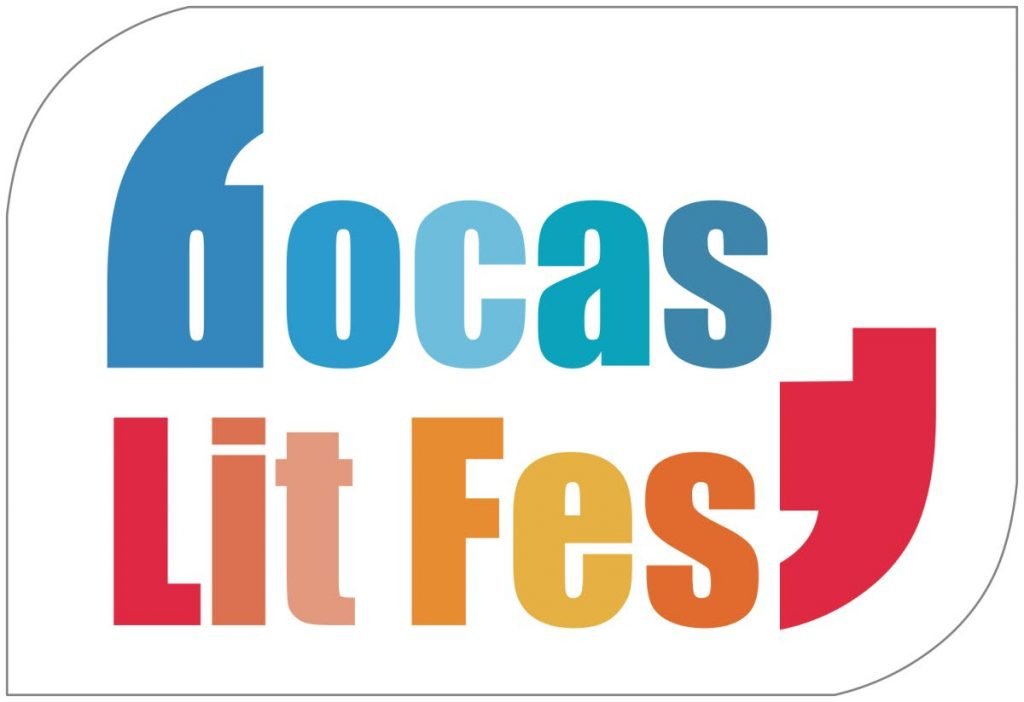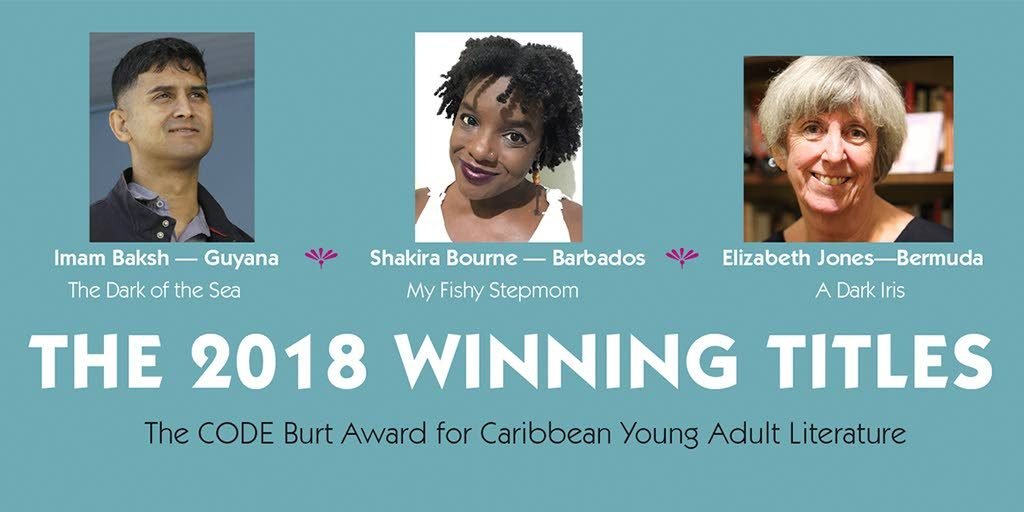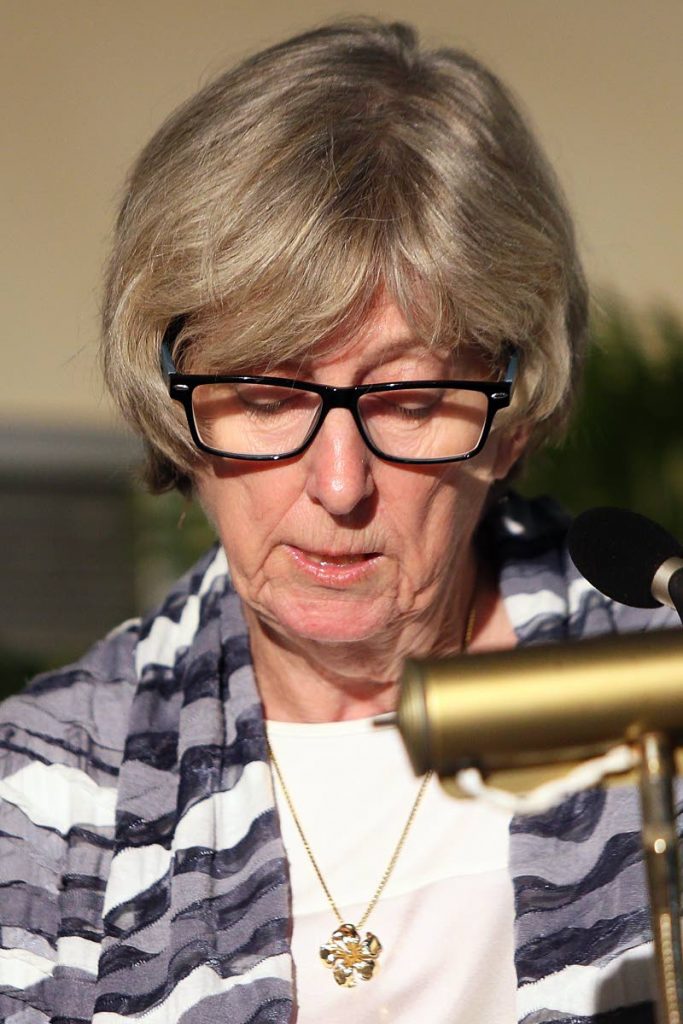Stories of our own

Someone, somewhere, will read one of the Code Burt Award finalists’ stories and it will take residence in their soul.
The Code Burt finalists, including the winner, Imam Baksh, spoke on April 26 to students and others on how their pieces came about and what it takes to be a writer.
The winner was announced on April 25, the opening night of the NGC Bocas Lit Fest. This year’s other finalists were Elizabeth J Jones (Bermuda), Baksh (Guyana) and Shakirah Bourne (Barbados).

As the Bocas Lit Fest continued, the finalists, along with Janet Smyth (children’s programme director of the Edinburgh International Book Festival), spoke to students and others at the AV Room, National Library, Abercromby Street, Port of Spain.
Their books, Jones’ A Dark Iris; Baksh’s The Dark of the Sea; and Bourne’s My Fishy Stepmom, while different, share a stylistic commonality. That commonality, Smyth said, is the idea of pulling through other realities.
In Jones’s A Dark Iris, the central character, Rebecca, is having experiences with stories and characters from the past. The characters tell her things about her present and her future.
In Bourne’s My Fishy Stepmom, the lead character, Josephine, “a bit of a snoop,” meets a mermaid who helps her and her father get over the loss of her mother.

Smyth said Bourne’s work was also special because it focuses on the relationship between Josephine and her dad.
“Dads, quite often, in young people’s writing, aren’t given enough status, and that is an important relationship, young people have, with their fathers.”

Baksh’s Dark of the Sea also tells of fairmaids (mermaids). His central character, Denesh, is a young man who has not had an easy time. “He finds school a challenge even though he is very bright, and he is also dyslexic, and it is not being recognised and supported in the way for a young person that it could have been. He is struggling to see a future, his friendship group.
“But then he discovers this other world beneath the waves of the fairmaids (also called mermaids),” Smyth told the audience.
Questioned about the use of alternative realities as a tool, Jones said it goes back to the poet William Blake, with whose poetry she fell in love, and who claimed he saw visions.
She began writing a novel about that, but put it aside. Jones, who writes for a living, went through a period of severe depression where “I felt I could not write anything fresh.”
She took an art class instead, and that led to a breakthrough: she could use writing as a tool to bring Bermuda’s history to the fore.
Baksh grew up with stories of what are now called mermaids. “They would comb their hair on the beach at night in moonlight, and they were beautiful, but they would argue. You could get treasure from them if you could trick them.
“But to most people as kids – eight, nine, ten – they were scary,” he said. “This friendly mermaid stuff that came along in the Disneyfied 90s, that is not the mermaid I grew up with.”
The root of this book, he added, went back to his second manuscript, about high-school privileged kids who are attacked by vampires.
“I was thinking about the third book and my brother was like, ‘Okay, so we did something terrible happening to lucky kids, let us take a kid in an unlucky situation and have something marvellous happen to them.’”
He then looked at his rural area in Guyana for inspiration, saying, “Where I live there are a lot of the social issues: high unemployment, high suicide rates, the education system suffering from a lack of staffing, parents who work so hard they are not around. “So I thought, ‘Okay, he will discover something wonderful with this mermaid.’ I didn’t want it to be a completely savage mermaid.
“But I knew she had to have an edge. It wasn’t going to be a cartoon.” Using American horror fiction writer HP Lovecraft’s idea of cosmic horror – the idea that humanity is insignificant in the universe – Baksh crafted The Dark of the Sea.
“In 2016 the World Health Organisation put out statistics that Guyana had the highest suicide rate in the world. It was a bit of a jump up, so people had questioned the statistics, because the methodology had changed.
“But even so, we have never been ranked lower than 12. Where I live, the rural area, it is higher than the rest of the country.
“So I started looking at the idea of cosmic horror and being faced with the idea that your world does not care about you, and then I lived in an area where the kids felt the world does not care about me.”
Bourne also uses a mermaid to help her central character, Josephine, and her father overcome their grief. She said this idea came from reading about a mermaid at school.
“I did English literature in third form and did not pay much attention in class, to be honest. But there was this one story in a Caribbean short-story book where a fisherman becomes captivated by a mermaid and she is just combing her hair on a rock, and basically he just goes to that spot every day and by the end of the story, they find his shoes or something. And they never see him and the mermaid again.”
The idea of not finding them haunted Bourne. “I was like, ‘Where did this man go? Who was this mermaid?’ And it has always been at the back of my head.”
She coupled this with her love for Caribbean mythology and folklore. “When I saw the call for Burt, I was like, ‘What should I write about?’
“I remembered that mermaid that haunted me and that fisherman story that haunted me.
“I had also written a short story about a little boy who had to save his father from a mermaid in a cave. It was a bit rushed for time, so I pulled what was in my head already and I combined the character of a mischievous little girl, because I wanted to write about a girl who is dealing with grief.
“It is a story about how to overcome grief, because her and her father are still grieving over the loss of the mother. In the father’s case, he is not even able to speak about the mother...It is a story about how to get over grief and it is done in a very, very tragic way, using this character of a mermaid...”
For students inspired to become writers, the finalist had this bit of advice: Bourne told them a writer could make a living, and said they should write down their stories, create videos and put them on YouTube.
“You never know where you can go. One story carried me all over the world. The same can happen to you as well.”

For Jones, a writer is a writer, whether published or not.
“If you want to be a writer, no one can really stop you. The only problem is whether you think being a writer is synonymous with being published.
“I am so thrilled about this award...but even if it had not happened I would still be writing. I would not have stopped. I am 68 and I hope I will continue until I pop...you’ll just do it anyway.”
Baksh offered practical advice, telling the students they had to be emotionally strong to show people their work and accept criticism.
He told them to have a few people around them who could offer advice.
“If one person says, ‘This isn’t working,’ that is one person. You can think about it...but if you find three or four people telling you there’s a problem in the same spot, then there’s a problem in that spot.
“Don’t let them tell you the solution. You’re the writer. You write the solution.”
Smyth offered one last piece of advice: “Keep reading.”


Comments
"Stories of our own"